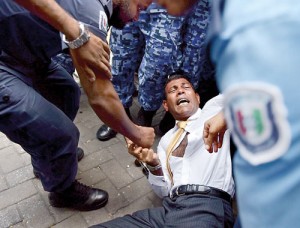Sunday Times 2
Release Mohamed Nasheed – an innocent man and the Maldives’ great hope
It may be famous for the pristine holiday beaches of its Indian Ocean coastline but the Maldives has taken a dark authoritarian turn. In 2008, the island nation became a democracy after Mohamed Nasheed was sworn in as president after the country’s first-ever free and fair elections. A charismatic leader, Nasheed introduced liberalising reforms at home, while calling for global action against climate change in an attempt to combat the rising sea levels that threaten to inundate the low-lying nation. His remarkable story is chronicled in the acclaimed documentary The Island President.

Maldives police try to move former president Mohamed Nasheed as he arrives at court in Male. Pic Adam Sireii/AFP
Seven years later, however, Nasheed is in prison, having been sentenced to 13 years imprisonment for the crime of “terrorism” following a politically motivated show trial.
As a young man, Nasheed made a name for himself as a dissident journalist who challenged the repressive regime of Maumoon Gayoom, the Maldives’ long-serving dictator. Over a 15-year period, Nasheed was arrested more than 20 times. He was twice named by Amnesty International a prisoner of conscience.
In 2003, he formed the opposition Maldivian Democratic party and in 2008, on a platform of human rights and democratic principles, Nasheed was elected president in the country’s first multiparty elections. But his presidency was cut short in February 2012 when he was forced to resign at gunpoint. Then, in the 2013 elections, the supreme court thwarted Nasheed’s bid to retake the presidency by annulling his victory in the first round and helping to manipulate the count until Abdulla Yameen – Gayoom’s half-brother – was installed in office.
In January 2015, the government had a new reason to fear Nasheed: Gasim Ibrahim, who had polled third in the 2013 presidential elections with 24% of the vote, left the government coalition with his party and joined Nasheed. With Gasim’s support, Nasheed could easily make a successful run in the next presidential elections. Overthrowing Nasheed in a coup had not been enough to neutralise him as an opponent.
So the government concocted a phony “terrorism” charge. In less than three weeks, Nasheed was arrested, tried, convicted, and sentenced. And for good measure, Yameen also purged and imprisoned his own defence minister, who was going to run against him to become head of the ruling Progressive party.
The charges against Nasheed were based on the 2012 arrest of an allegedly corrupt Maldivian judge. The judge’s arrest was re-cast as a terrorist “abduction”, even though there was no evidence Nasheed had ordered the arrest or knew about it in advance. The key witness testified that he had simply “assumed” Nasheed was involved, and the court found this sufficient. Indeed, the judges refused every request by Nasheed to call defence witnesses to testify because – as the court conveniently concluded – such witnesses “would not be able to refute the evidence submitted by the prosecution”.
The judiciary pressed forward to their conclusion at breakneck speed in a trial that could have been taken straight from Kafka. Nasheed’s lawyers were expected to review more than a thousand pages of documents overnight and were repeatedly denied access to their client. Many important court hearings took place without counsel being present at all. Before the first hearing, Nasheed was manhandled and physically dragged into the courtroom by police because he talked to reporters. And although the court is required to be “independent and impartial”, the prosecutor-general and two of the three judges submitted witness statements that were used as part of the prosecution case.
Nasheed’s conviction for “terrorism” and the crushing 13-year sentence are a mockery of justice, designed to punish him for criticising the government and remove him as a political threat. Only a few weeks later the parliament controlled by the ruling party adopted a new law making it illegal for anyone imprisoned in the Maldives to be a member of any political party. Nasheed’s conviction sends a loud and clear message to the Maldivian people: opposition to the ruling regime will not be tolerated.
This sinister turn of events has not gone unnoticed. There are daily street protests in the Maldives calling for Nasheed’s release, as well as considerable international support for him and condemnation of the egregious actions of the Maldivian government. The UN high commissioner for human rights, Zeid Ra’ad Al-Hussein, voiced strong concern over Nasheed’s “hasty and apparently unfair trial”, and Amnesty International has characterised it as a “travesty of justice”.
We have filed the case with the UN, urging it to declare his detention arbitrary and in violation of international law. Yameen must indeed be told in unequivocal terms by the international community that he must free the man they call the Island President.
(Amal Clooney is a barrister with Doughty Street Chambers. Also contributing to this article were Jared Genser, founder of Freedom Now, and Ben Emmerson, a barrister with Matrix Chambers, who serve as international counsel to Mohamed Nasheed)
Courtesy the
Guardian, UK
(See also Page 9)

